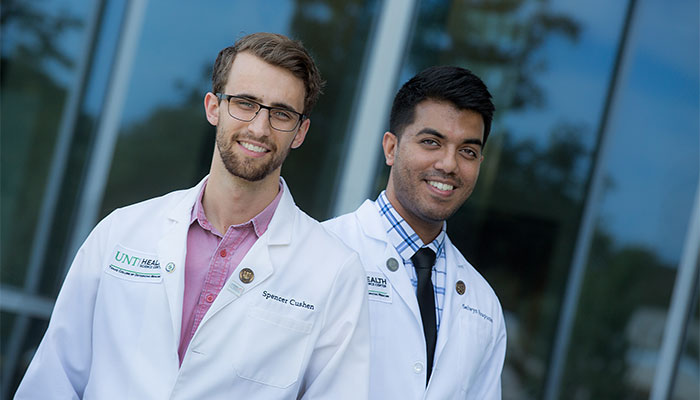Med students discovering the value of lab research
By Jan Jarvis

After spending the summer doing research on gestational hypertension, TCOM student Spencer Cushen changed his career plans.
He still wants to be a physician, but now he plans to add a doctorate and possibly a master’s in public health. Doing research, he said, has helped him see the many benefits of pursuing dual degrees.
“I’ll be more competitive for physician-scientist residency positions and faculty positions in academic medicine, I’ll gain the skills associated with a PhD, and I’ll be able to help more patients through research,” he said. “My ultimate goals are to be able to make the world a better place through my skill set, a skill set that I am crafting to include clinical, bench and public health training.”
Cushen, who participated in the Institute for Cardiovascular and Metabolic Diseases Summer Research Rotation, is among a growing number of medical students who are discovering the value of spending more time in a lab.
Research plays a critical role in clinical and education practices, said Peggy Smith-Barbaro, PhD, Special Advisor to the Vice Provost of UNTHSC’s Health Institutes. Between 20 percent and 25 percent of all TCOM students conduct an elective research project in the biomedical sciences, patient-oriented clinical studies or health services during their four years of education.
“We really believe medical students should be exposed to research,” she said. “It helps them to approach medicine from a broader perspective and look at the patients they treat in a more comprehensive way.”
TCOM student Selwyn Erapuram participated in the program because he wanted to gain a deeper understanding of topics and molecular mechanisms that he had only briefly learned about in class. Working with a mentor gave him insight and a greater appreciation of how research is conducted.
“In a nutshell, the research experience has altered the way I tackle difficult concepts in class,” Erapuram said. “Rather than just memorizing it for the sake of the exam, I do my best to understand it on a deeper level.”
The experience hasn’t changed his career path, but it has enriched it.
“I do see myself engaging in some sort of clinical research in the future,” he said. “This past summer has given me the drive to be a participant in the advancement of my profession, rather than just a spectator.”
The summer rotation gives students the opportunity to learn fundamental techniques in medical research and about ongoing research, said Erapuram’s mentor, Joseph Yuan, PhD, Assistant Professor, Institute for Cardiovascular and Metabolic Disease.
“More importantly, students get to apply the knowledge gained in the classroom to improve the prevention and treatment of cardiovascular diseases, such as hypertension, stroke, diabetes, and obesity,” Dr. Yuan said.
During the program, TCOM students who want a career in academic medicine become familiar with the scientific process and learn how to integrate laboratory skills and techniques in order to address health-related problems, said Styliani “Stella” Goulopoulou, PhD, Assistant Professor, Institute for Cardiovascular and Metabolic Diseases. But participation in research is not important only for those who are going to follow a career in academia, said Dr. Goulopoulou, who was a mentor for Cushen.
“Involvement in research teaches students analytical and critical thinking skills,” she said. “These skills help them interpret the scientific literature accurately and apply their conclusions in disease diagnosis and treatment.”




Social media